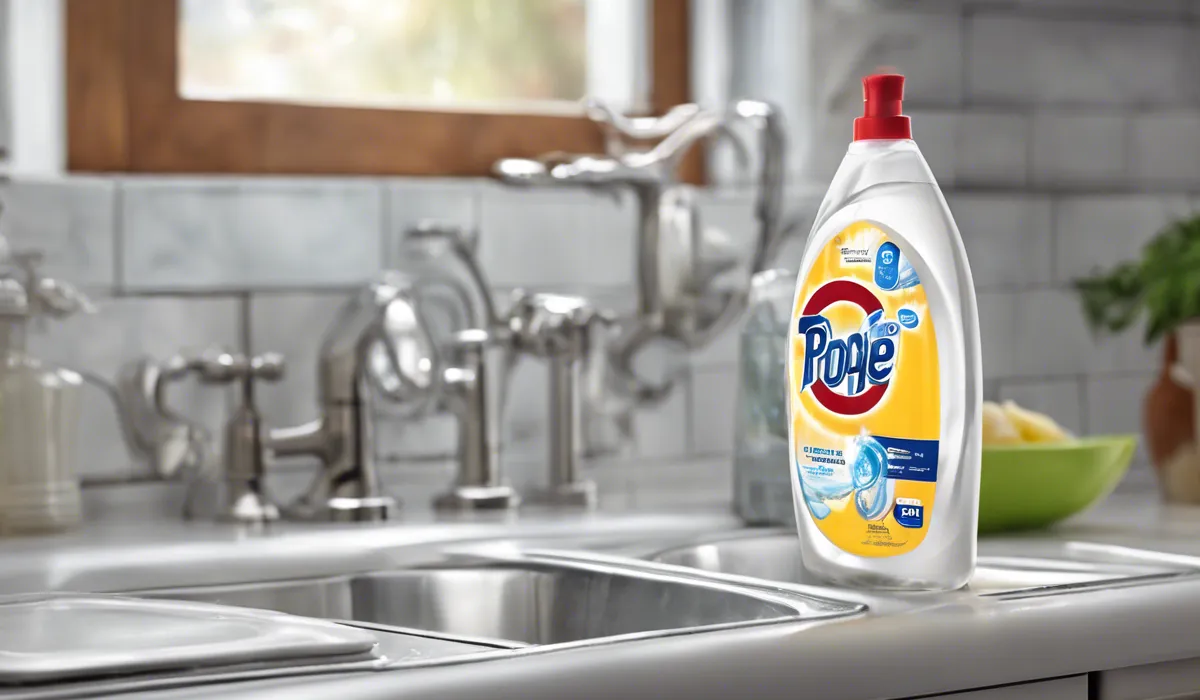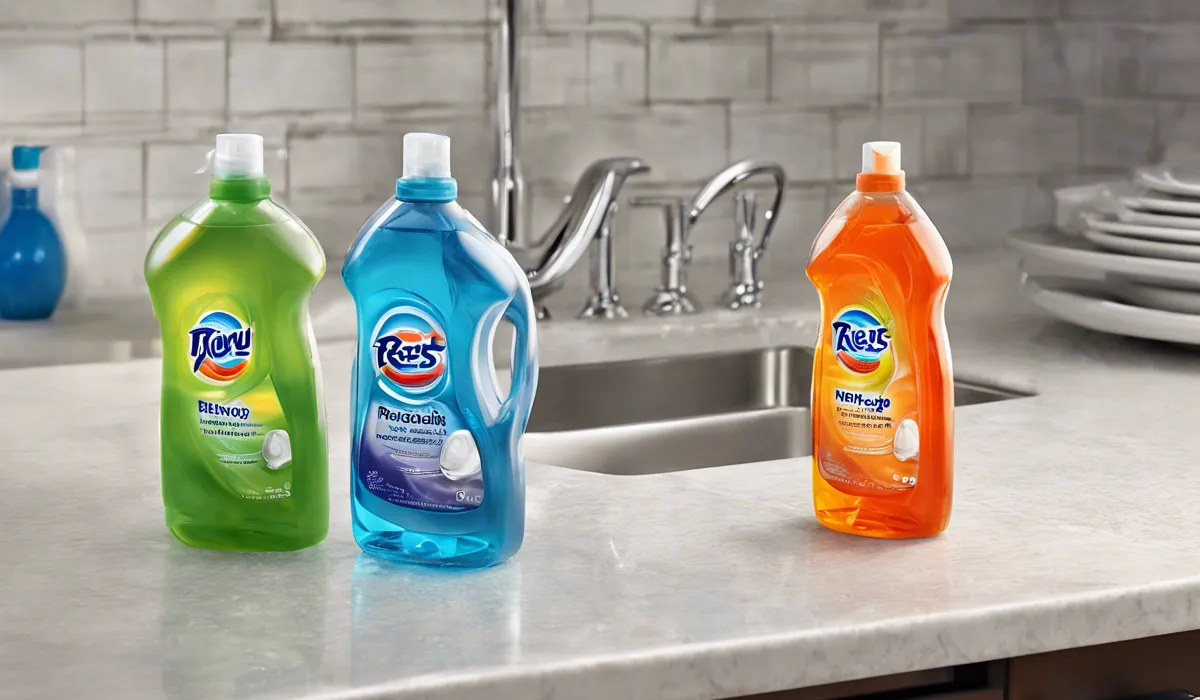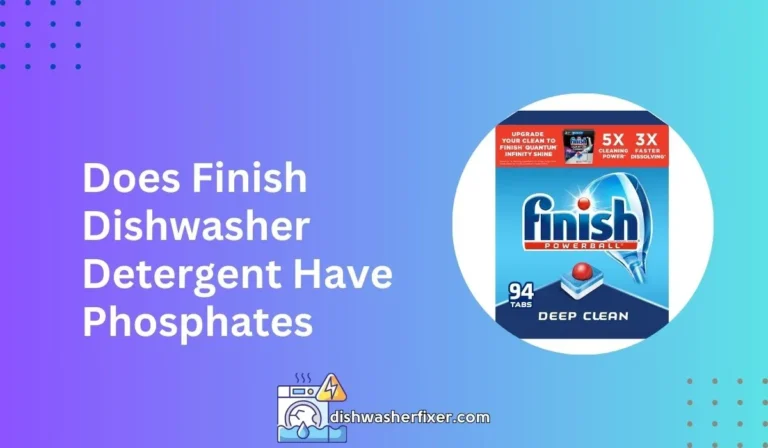How Much Dish Soap for Dishwasher? Avoid Suds Disasters!
For a dishwasher, use only designated dishwasher detergent, not dish soap. Add one dishwasher detergent pod, tablet, or 1-2 teaspoons of powder per load as recommended by the detergent brand.
Understanding Dishwasher Detergent Usage

Importance of Using the Right Amount
Using the correct quantity of dishwasher detergent is essential for several reasons. First, it ensures that your dishes come out of the dishwasher clean and free from residue.
Secondly, it helps maintain the efficiency and lifespan of your dishwasher by preventing the buildup of soap scum and other deposits.
Moreover, using the right amount is both cost-effective and environmentally friendly, as it avoids unnecessary waste and pollution.
Differences Between Dish Soap and Dishwasher Detergent
Dish soap and dishwasher detergent are formulated differently to suit their specific uses. Dish soap, designed for hand washing, creates suds to help scrub dishes clean.
In contrast, dishwasher detergent is low-sudsing and designed to work under the high-pressure, high-temperature conditions of a dishwasher. Using dish soap in a dishwasher can lead to an overflow of suds and potential damage to the appliance.
Consequences of Using Too Much Detergent
Adding too much detergent can result in a film of residue left on dishes, which could be harmful if ingested.
It can also strain the dishwasher’s components, leading to potential malfunctions and costly repairs. Furthermore, excessive detergent contributes to environmental pollution, as more chemicals are released into the water system.
Consequences of Using Too Little Detergent
On the other hand, using too little detergent may not clean your dishes effectively, leaving food particles and grease behind.
This can attract bacteria and odors, making your dishwasher unhygienic. It can also result in the need to rewash items, wasting water and energy.
Guidelines for Dishwasher Detergent Quantities

Reading and Interpreting Detergent Labels
Detergent labels contain crucial information about how much product to use per load. It’s important to read these labels carefully to ensure you’re using the correct amount.
Look for specific instructions based on the dishwasher model and load size, as well as any special considerations for water hardness or heavily soiled dishes.
Recommended Amounts for Different Load Sizes
Most brands recommend using one dishwasher detergent pod, tablet, or 1-2 teaspoons of powder per load.
However, this can vary depending on the size of the load and the type of detergent. A full load typically requires a full dose of detergent, while a half load may only need half a dose to achieve the same level of cleanliness.
Adjusting Detergent Based on Water Hardness
Water hardness is a measure of the mineral content in water, and it can affect the performance of dishwasher detergent. Soft water requires less detergent, as it does not interfere with the cleaning action as much as hard water does.
Conversely, hard water may necessitate a larger amount of detergent or the addition of a water softening agent to combat the minerals that can leave spots and film on dishes.
Best Practices for Dishwasher Soap Efficiency

Pre-Rinsing Dishes and Its Impact on Detergent Usage
Pre-rinsing dishes before placing them in the dishwasher can be unnecessary and wasteful, especially with modern dishwashers designed to handle food residue.
Skipping pre-rinsing can save water and ensure that the enzymes in your dishwasher detergent have something to act upon, thus potentially reducing the need for extra detergent.
Tips for Detergent Storage and Conservation
Proper storage of dishwasher detergent is important to preserve its efficacy. Keep it in a cool, dry place to prevent clumping or degradation.
Additionally, conserving detergent by only using the necessary amount not only saves money but also reduces environmental impact.
Alternative Cleaning Solutions and When to Use Them
There are times when you might seek alternative cleaning solutions for your dishwasher. For example, baking soda and vinegar can be used for occasional deep cleaning and deodorizing.
However, these should not replace your regular dishwasher detergent, as they do not provide the same level of sanitization and grease-cutting power.
FAQs About Dishwasher Detergent Usage
FAQ Question: Can I use regular dish soap in my dishwasher?
FAQ Answer: No, you should not use regular dish soap in your dishwasher as it can create suds that may damage the machine. Use only designated dishwasher detergent.
FAQ Question: How much dishwasher detergent should I use per load?
FAQ Answer: Use one dishwasher detergent pod, tablet, or follow the brand’s recommendation, which is typically 1-2 teaspoons of powder per load.
FAQ Question: Is it possible to use too much dishwasher detergent?
FAQ Answer: Yes, using too much dishwasher detergent can cause residue on dishes and may lead to excess suds that can damage your dishwasher.
FAQ Question: What happens if I accidentally put dish soap in my dishwasher?
FAQ Answer: If dish soap is put in a dishwasher, it can create excessive suds that might cause leaks, overflow, and potential damage to the machine.
FAQ Question: Can I use a substitute for dishwasher detergent if I run out?
FAQ Answer: It’s not recommended to substitute dishwasher detergent with other cleaning agents; however, in an emergency, a small amount of baking soda and vinegar can be used temporarily.
Final Thoughts
It’s crucial to use only designated dishwasher detergent in dishwashers, not regular dish soap.
For optimal results, add precisely one pod, tablet, or 1-2 teaspoons of powder detergent per load, adhering to the guidelines provided by the detergent’s manufacturer.
Useful Resources
- https://news.wisc.edu/curiosities-whats-the-difference-between-dishwasher-detergent-laundry-detergent-and-dish-soap-why-arent-they-interchangeable/
- https://extension.umn.edu/yard-and-garden-news/coming-clean-soap-garden
- https://environment.uoregon.edu/how-wash-your-dishes-sustainably-according-experts





